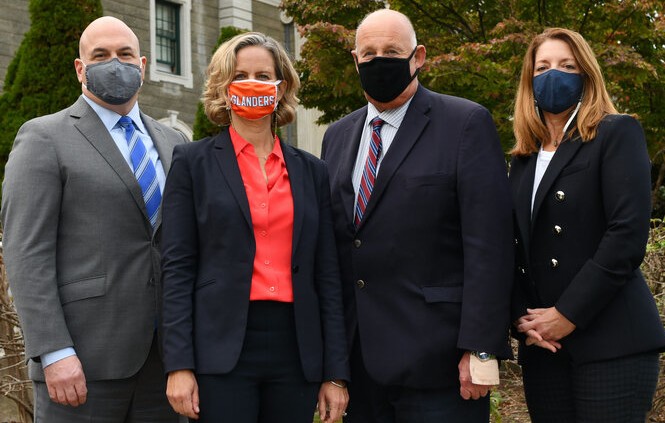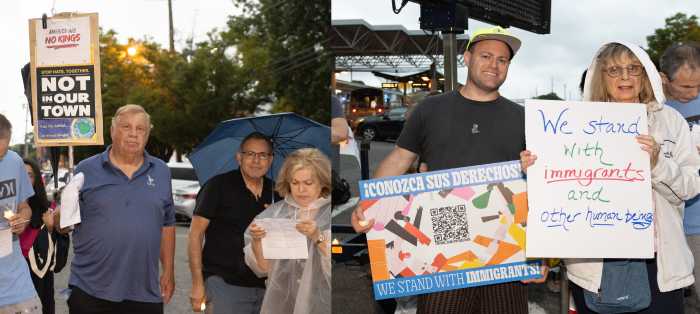The coronavirus pandemic has shaken Long Island’s economy to its core.
With every aspect of daily life paused by restrictions to stop the spread of COVID-19, local merchants have been left wondering when, if ever, business as usual would return.
Nassau County Executive Laura Curran hosted daily briefings, virtual Town Halls, launched Public Service Announcements and set up webpages to get up-to-the-minute updates. Curran and her administration set up an SMS message service, available in six languages, so that notifications could be pushed out and information could be seamlessly relayed to the people who needed it most.
After several painstaking months of shutdowns and the gradual fall of confirmed cases on Long Island, the region was permitted to begin reopening. In stages, carefully attempting to avoid any further outbreak, sectors of the economy reopened with new guidelines, restrictions, and regulations to keep people safe. In fact, the normal we returned to has seemed anything but, as those new safety precautions took shape.
Business owners shouldered the burden of abiding by these new safety procedures while also producing the goods and services needed by Nassau County’s 1.3 million residents. Many small business owners, already dealing with a cash crunch from months without commerce, were forced to spend hundreds, if not thousands, of dollars to reinvent their operating procedures, buy personal protective equipment (PPE), hire new staff for cleaning — all the while operating at a fraction of their previous capacity.
Many were contemplating closing their doors for good without some assistance from government.
“Immediately following our front-line response, my top priority was understanding the impact of this crisis on our small and large businesses and those who provide our residents with essential services,” said Curran. “I made it my business to get back to business safely and to get our downtown communities bustling again.”
She took immediate action, and Nassau became the state’s first county to create a Coronavirus Economic Advisory Council to track the losses of the business community and identify, in real time, their needs. Represented on the council were some of the region’s top business and nonprofit leaders who provided input on an ongoing basis.
It became clear that businesses were concerned about three things during the reopening stages: access to financial resources if needed, consumer confidence, and the ability to afford PPE to achieve that level of consumer confidence.
“With this challenge before my administration, I charged my economic development team with developing programs and resources to support businesses’ specific needs as they navigated through these uncharted waters,” Curran continued.
Curran’s deputy for economic development, Evlyn Tsimis, oversaw the distribution of a special allocation of federal HUD funding under the community development block grant program, intended to support hard-hit regions. The county’s team worked with the Nassau Industrial Development Agency (IDA), and Nassau’s Local Economic Assistance Corporation (LEAC) to establish a campaign called Boost Nassau to aid Nassau’s businesses’ most pressing needs as advised by the business community: PPE for employees and patrons and financial aid.
“In collaboration with the county executive, we were able to take immediate steps to capitalize on Gov. Andrew Cuomo’s New York Forward Loan Fund and make $10 million in loans available for our county’s small businesses and nonprofits,” said Richard Kessel, chairman of the Nassau County IDA and LEAC. “These businesses were able to obtain up to a $100,000 loan at a very low interest rate, to help ease the financial uncertainty caused by the pandemic. This quick action, undoubtedly, helped countless doors stay open during some of the most difficult times.”
And in cooperation with the Town of Hempstead, the Boost Nassau program also awarded more than 3,000 companies, small businesses, and nonprofits with free PPE starter kits. This helped ease the new financial stress placed on businesses to provide PPE and other cleaning measures in the workplace.
“We understand that not one Nassau County resident or business had expected 2020 to bring a global pandemic to our shores,” said Harry Coghlan, CEO of the Nassau IDA and LEAC. “Our local economy and downtowns have been forced to reinvent themselves while working to implement new regulations and requirements. For any sized business this could be challenging, if not impossible, without assistance,” continued Coghlan.
Furthering the Boost Nassau recovery efforts for small businesses, Nassau and Suffolk officials and the IDA partnered with Discover Long Island and debuted a new innovative mobile Downtown Deals Travel Pass showcasing the best of Long Island’s downtowns and providing economic stimulus through incentivized marketing efforts for small businesses, restaurants, and attractions.
“As case numbers steadily dropped, I wrote to the state in support of reopening gyms and fitness centers, barbers, nail salons, malls, and youth sports — including private organizations and public schools — after touring their facilities,” Curran continued. “I was impressed by our business owners’ ingenuity and the smart safety measures they put in place. I knew they were ready and could protect employees and customers. And the proof is in the numbers. We’ve held a 1 percent positivity rate all while expanding our reopening and getting people back to work.”
However, the challenges surrounding the coronavirus are far from over. The business community, while reopened, is not without anxiety about a future shutdown and a second wave that appears to be hitting dozens of states across the country.
“Staying in close communication with our business community has helped us identify their needs in real time and develop targeted, meaningful programs to assist with reopening safely,” said Evlyn Tsimis, deputy county executive for economic development. “We were creative in our use of federal resources and collaborated with the IDA team to get this done.”
Curran, the Nassau IDA, and LEAC encourage all businesses owners to follow them on social media to stay apprised of COVID updates, additional assistance programs, and helpful webinars to aid businesses.


























